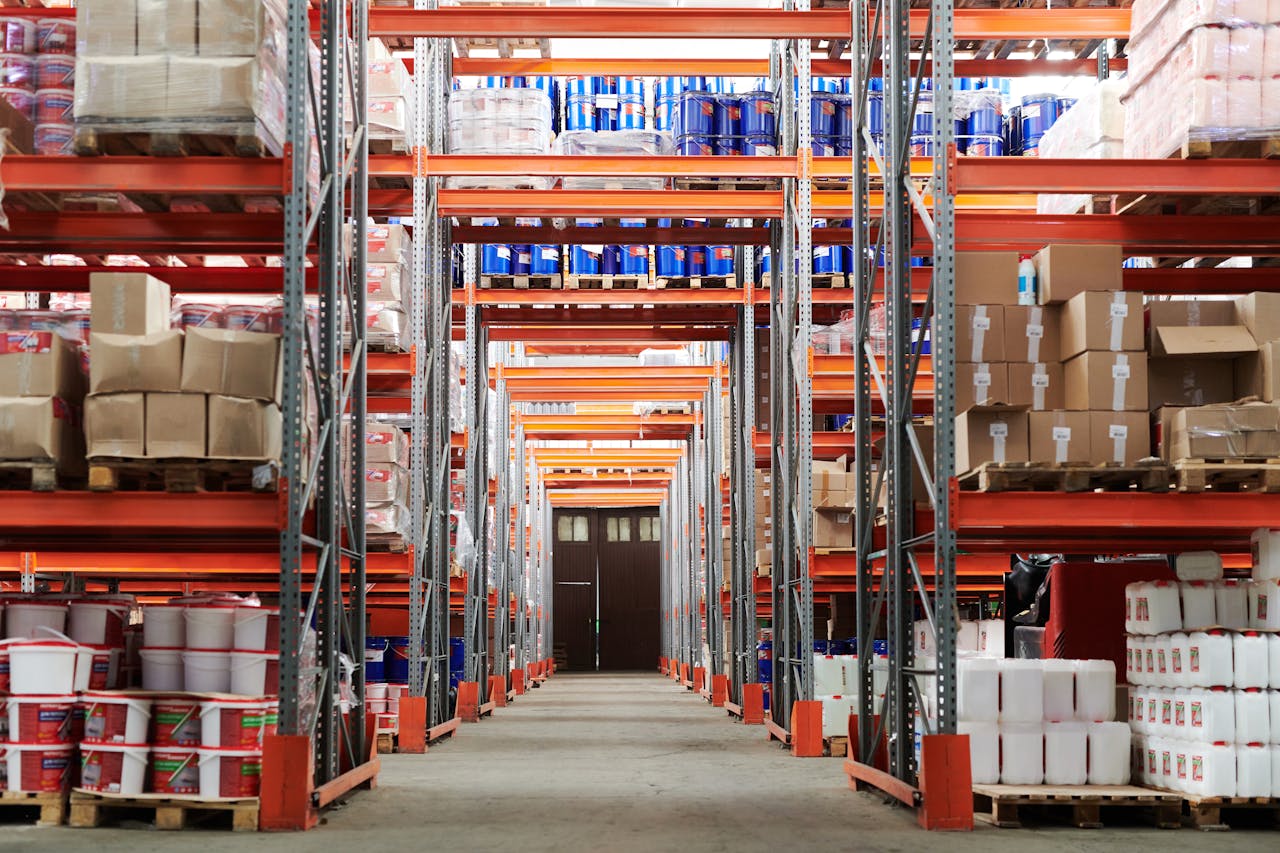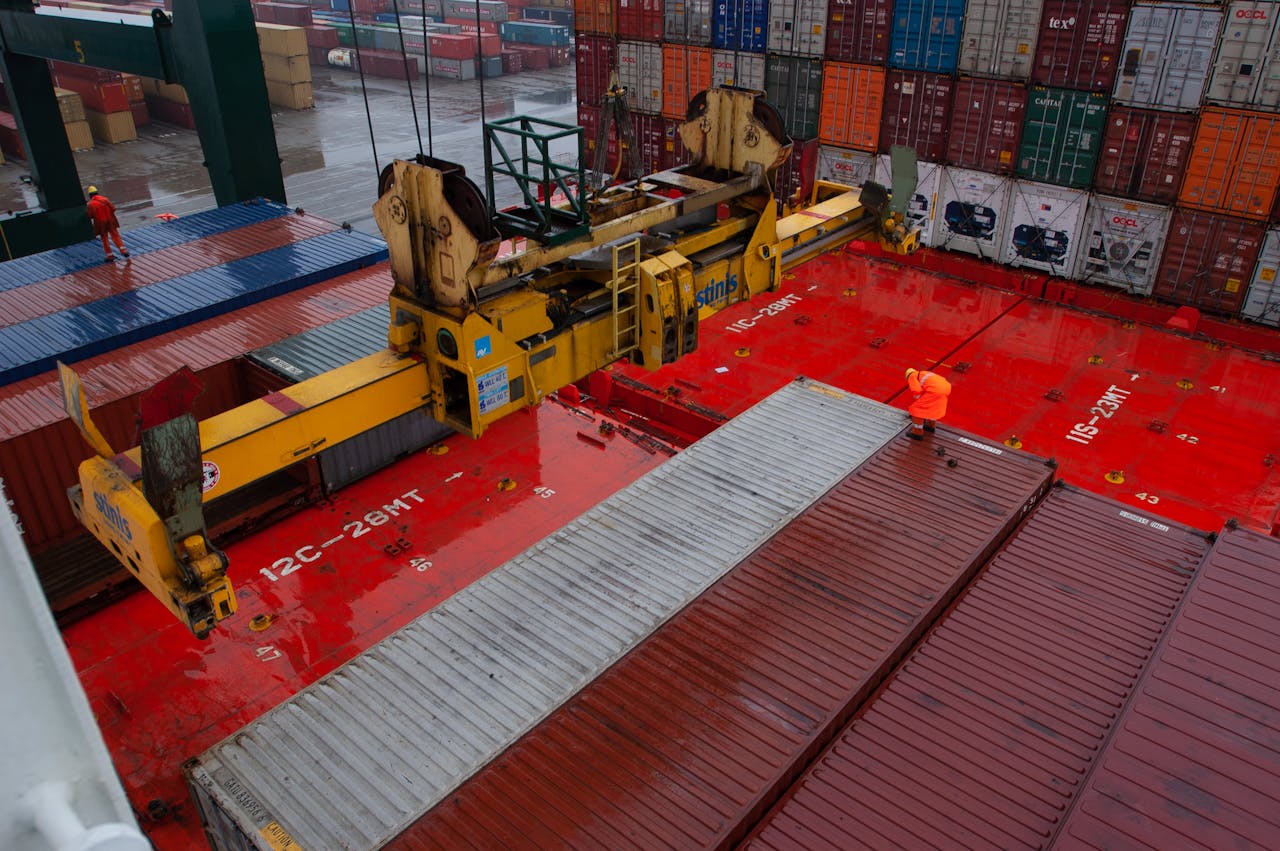نحن نعلم أن هناك قدرًا معينًا من "حساء الأبجدية" في مجال الخدمات اللوجستية. قد يبدو الأمر وكأن هناك اختصارًا لكل شيء، وTBH موجود. (انظر ماذا فعلنا هناك؟!)
حتى أنواع شركات الخدمات اللوجستية لديها واحدة؛ ربما تكون قد صادفت 3PL و4PL في تجربتك مع قطاع الشحن. ولكن ماذا تعني، وكيف سيؤثر ذلك على اختيار الموردين الخاص بك؟
باختصار، 3PL و4PL هما نموذجان أعمال مختلفان، ومعرفة الاختلافات ستضمن لك اختيار النموذج المناسب لاحتياجاتك.
تريد أن تعرف ما هي تلك الاختلافات؟ دعونا نتعلم!
ما هو 3PL؟
يقدم مزود الخدمات اللوجستية التابع لجهة خارجية، أو 3PL، خدمات لوجستية خارجية، مثل التخزين والنقل وتلبية الطلبات. وهم يتعاملون عادةً مع جميع المهام المتضمنة في توصيل المنتجات من المستودع إلى العميل، بما في ذلك إدارة المرتجعات.
الخدمات الرئيسية
توفر 3PLs خدمات تساعد الشركات على إدارة عمليات سلسلة التوريد الخاصة بها بكفاءة أكبر حتى تتمكن من التركيز على الأنشطة التجارية الأساسية.
تقدم 3PLs خدمات مثل:
التخزين
من خلال توفير مساحة تخزين للمخزون، تساعد 3PLs الشركات من خلال إدارة مخزونها والحفاظ على سلامة البضائع حتى تصبح جاهزة للشحن.

استيفاء الطلب وإرجاعه
تغطي 3PLs انتقاء البضائع المخزنة وتعبئتها وشحنها وتضمن وصول العناصر إلى عملائها في الوقت المحدد وبأمان. كما أنهم يتعاملون مع عمليات الإرجاع والاستبدال والإصلاحات.
مواصلات
من خلال تنسيق الشحنات مع شركات النقل المختلفة لتسليم الطلب الأمثل، تقوم 3PLs بتوصيل المنتجات إلى العملاء أو نقاط التوزيع الأخرى.
إدارة المخزون
تقوم 3PLs بتتبع مستويات المخزون في الوقت الفعلي، مما يساعد الشركات على تجنب الإفراط في تخزين المنتجات أو نفادها.
تستخدم 3PLs التكنولوجيا المتقدمة مثل WMS، أو أنظمة إدارة المستودعات، لدعمهم كمركز لوجستي متكامل الخدمات. الاستثمار في التكنولوجيا يعني أخطاء أقل، وعمليات تسليم أكثر كفاءة، وإدارة دقيقة للمخزون.
الفوائد
دعونا نستعرض المزايا التجارية للشراكة مع 3PL.
توفير في التكاليف
بدءًا من أسعار الشحن المحسنة إلى تقليل الإنفاق على البنية التحتية، ومن خفض تكاليف العمالة والنفقات العامة إلى تحسين إدارة المخزون مما يؤدي إلى تقليل مخاطر التكدس في المخزون أو النفاد، تعمل 3PLs على تبسيط العمليات اللوجستية لتوفير المال في كل زاوية.
تحسين كفاءة
إن استخدام التكنولوجيا المتقدمة يعني أن قدرات التخزين لدى 3PLs فعالة للغاية مع انخفاض كبير في معدل الأخطاء. عادةً ما يكون لدى 3PLs شبكات واسعة وراسخة مع شركات النقل والمستودعات والموردين، مما يعني أنه يمكنهم الاستفادة من وفورات الحجم والوصول إلى أسعار أفضل وطرق شحن مُحسّنة.
قابلية التوسع
توفر 3PL خدمة قابلة للتطوير بالكامل ويمكن تصميمها لتلبية الاحتياجات المحددة للعملاء، مما يوفر مزايا للشركات عندما يتعلق الأمر بالمرونة وإدارة التكلفة. يمكّنك حل 3PL القابل للتطوير من تكييف متطلباتك اللوجستية دون الحاجة إلى الاستثمار للقيام بذلك.
تسمح قابلية التوسع أيضًا بالتوسع البسيط والسريع في مناطق أو مناطق جغرافية جديدة نظرًا لأن شركة 3PL لديها بالفعل البنية التحتية اللازمة لدعمك.
خبرة
إن موفري خدمات 3PL هم خبراء يتولون العمليات اللوجستية الخاصة بك حتى تتمكن من التركيز على الكفاءات الأساسية، والتي بدورها تمكنك من الحفاظ على النمو والبقاء قادرًا على المنافسة في السوق الخاص بك.
ومن خلال أحدث المعرفة بالقواعد والتسجيلات، يمكنهم إدارة المشكلات التي تنشأ، مما يحافظ على امتثالك وفي حدود الميزانية.
ما هو 4PL؟
يأخذ 4PL على مستوى أعلى من المسؤولية من 3PL. لا يقتصر الأمر على تغطية العمليات اللوجستية فحسب، بل إن 4PLs هم شركاء استراتيجيون يشرفون على سلسلة التوريد بأكملها ويديرونها نيابة عن عملائهم.
حيث يركز 3PL على القيام بمهام لوجستية محددة مثل التخزين والنقل وتلبية الطلبات، يشرف 4PL على العديد من 3PLs ومقدمي الخدمات اللوجستية الآخرين لتقديم حل إدارة سلسلة التوريد الشامل. تركز 4PLs على التنسيق والتشاور لإنشاء شبكة سلسلة توريد سلسة.
الفوائد
ما هي فوائد استخدام 4PL لتبسيط العمليات اللوجستية الخاصة بك؟
نهج 360 درجة
تتمتع 4PLs بنهج شامل لإدارة سلسلة التوريد، حيث تقدم حلاً شاملاً يدمج ويحسن كل جانب من جوانب الخدمات اللوجستية من خلال سلسلة التوريد. من خلال الفهم الكامل والعميق لسلسلة التوريد، تقوم 4PLs بتسليط الضوء على أوجه القصور وتحسينها بخبرة لتقليل التكاليف وضمان عمل جميع العناصر بسلاسة.
شبكة قوية
يمكن أن تقدم 4PLs حلولاً لوجستية مخصصة لتلبية احتياجات العمل الفريدة لأن لديها شبكة قوية وواسعة من 3PLs وشركات النقل والموردين وشركاء التكنولوجيا. تمكن هذه الشبكة 4PLs من اختيار شركاء فعالين من حيث التكلفة وذوي كفاءة لكل مهمة لوجستية تشارك في سلسلة التوريد وخارجها.
نقطة اتصال واحدة
يوفر استخدام 4PL للشركات راحة كبيرة تتمثل في وجود جهة اتصال واحدة تغطي كل ما يتعلق بالخدمات اللوجستية. تعمل 4PLs كمحور مركزي، مما يقلل من مخاطر سوء التواصل وعدم الكفاءة.
نظرًا لمستوى الإدارة الذي تتلقاه، فإن الشراكة مع 4PL ستكلفك أكثر من 3PL.
الاختلافات الرئيسية: 3PL مقابل 4PL
في حين أن كلا من 3PLs و4PLs يلعبان أدوارًا حاسمة في مجال الخدمات اللوجستية، فإن مجالات تركيزهما ومستويات التحكم وأساليب إدارة سلسلة التوريد تختلف بشكل كبير. دعونا نحلل الفروق الرئيسية:
الوظيفة الأساسية
تركز 3PLs على مهام لوجستية محددة. وبالمقارنة، فإن 4PLs تأخذ دورًا أوسع، يغطي نقل الشحنات وتكامل التكنولوجيا. 4PLs هي متجرك الشامل للعملية اللوجستية بأكملها، حيث تقوم بتنسيق العديد من 3PLs.
الموردين
يقوم الطرف الثالث بنقل البضائع الخاصة بك من النقطة أ إلى النقطة ب بكفاءة عالية، بما في ذلك تقديم رؤى البيانات مثل تتبع المخزون في الوقت الفعلي وتحليلات الشحن.
ومع ذلك، يقوم 4PLs بالتصغير لرؤية الصورة الأكبر، وتحليل سلسلة التوريد بأكملها وتنسيق كل جانب لتحسينها من النهاية إلى النهاية.
تواصل
توفر 4PLs نقطة اتصال واحدة لما يمكن أن يكون عملية لوجستية معقدة للغاية تشمل العديد من الأطراف. على الرغم من أن هذا أمر مريح للغاية، إلا أنه يعني أيضًا تأخير الرسائل حيث يتعين عليها التصفية عبر السلسلة إلى الطرف الثالث قبل الوصول إلى الطرف الرابع - والعودة مرة أخرى.
توفر الشراكة مع 3PL للشركات المزيد من الاتصالات المباشرة، مما يعني أنه يمكن معالجة المشكلات بمزيد من السرعة.
3PLS و4PLS: العمل معًا
مثل أي شيء، العمل الجماعي يمكن أن يجعل الحلم يتحقق. و3PLs و4PLS يشكلان فريقًا قويًا بشكل لا يصدق. فكر في 3PLs باعتبارهم متسابقين في التتابع، يبذلون قصارى جهدهم لإيصال حمولتك إلى المكان الذي يجب أن تكون فيه. 4PLs هم المدربون الذين يضعون الاستراتيجيات ويحسنون ويوجهون العملية.
يشرف 4PLs على العملية اللوجستية بأكملها، ويحلل أهداف العمل ويضع استراتيجيات مبسطة للوصول إلى هدفك. إنهم يختارون ويديرون 3PLs من شبكتهم الواسعة من مقدمي الخدمة الموثوقين لبناء فريق الأحلام هذا.
يعتمد دور 3PLs في هذا التعاون على خبرتهم ومهارتهم في التخزين والنقل وتلبية الطلبات. إنهم يعملون بجد لإدارة العمليات اليومية والعناية الجيدة ببضائعك؛ على عكس 4PLs، الذين لن يلمسوا البضائع فعليًا أبدًا، فإن 3PLs يتدربون على الشحنات.
3PL مقابل 4PL: ما هو الأفضل لعملك؟
عند الاختيار بين 3PL و4PL، يعد فهم أهداف عملك واحتياجاته أمرًا حيويًا. وهنا بعض الاعتبارات الرئيسية.
حجم الأعمال والتعقيد
قد تستفيد الشركات الصغيرة ذات سلاسل التوريد الأقل تعقيدًا من الاتصالات المباشرة والخدمات المركزة التي تقدمها شركة 3PL. قد تجد الشركات الكبرى ذات الانتشار العالمي خدمات 4PL التي تركز على الإستراتيجية أكثر ملاءمة لأنها تدير العديد من مقدمي الخدمات وتعمل على تحسين سلسلة التوريد بأكملها عبر أسواق ومناطق جغرافية متعددة.
الخبرة اللوجستية
إذا كان عملك لديه فريق لوجستي راسخ، فقد يكون توفير 3PL كافيًا. ومع ذلك، إذا كان فريقك يفتقر إلى الخبرة أو كنت ترغب في التركيز على الكفاءات الأساسية، فإن الشراكة مع 4PL يمكن أن تمنحك التوجيه الاستراتيجي اللازم.
أهداف النمو
بالنسبة للشركات الراغبة في التوسع في أسواق جديدة أو توسيع نطاق عملياتها من المحلية إلى العالمية، يمكن أن يكون 4PL خيارًا ذكيًا. وذلك لأن 4PLs توفر توجيهًا استراتيجيًا للمساعدة في تحسين سلسلة التوريد لتحقيق النمو المستقبلي، بما في ذلك تحديد الفرص لتحقيق كفاءة أعلى، وتوفير الخبرة التي تساعد الشركات على التغلب على التحديات الجديدة والاستفادة من شبكة قوية من مقدمي الخدمات الموثوقين.
على الرغم من تفوقهم في التعامل مع المهام اللوجستية التشغيلية بشكل عملي، إلا أن 3PLs قد لا يقدمون نفس المستوى من الدعم الاستراتيجي طويل المدى.

اختيار الشريك اللوجستي المناسب لعملك
يلعب كل من 4PLs و3PLs أدوارًا مهمة في حركة البضائع حول العالم، مما يوفر أموال الشركات وتسهيل سلاسل التوريد لتحقيق أقصى قدر من الكفاءة. يدير 3PLs الحركة المادية للبضائع، في حين يشرف 4PLs على الخدمات اللوجستية بشكل أكثر شمولية، مع رؤية أوسع لأهداف عملك.
بالنسبة لبعض الشركات، فإن خبرة 4PL ونهجها الاستشاري سيضعها في وضع أفضل، بينما بالنسبة للآخرين، يمكن أن يكون 3PL المخصص كافيًا للحفاظ على شركتهم وتنميتها.
هل تريد معرفة ما إذا كنت أكثر ملاءمةً لـ 3PL أو 4PL؟ الألفية يمكن أن تساعد. تواصل معنا اليوم للحصول على مشورة الخبراء لدينا.

